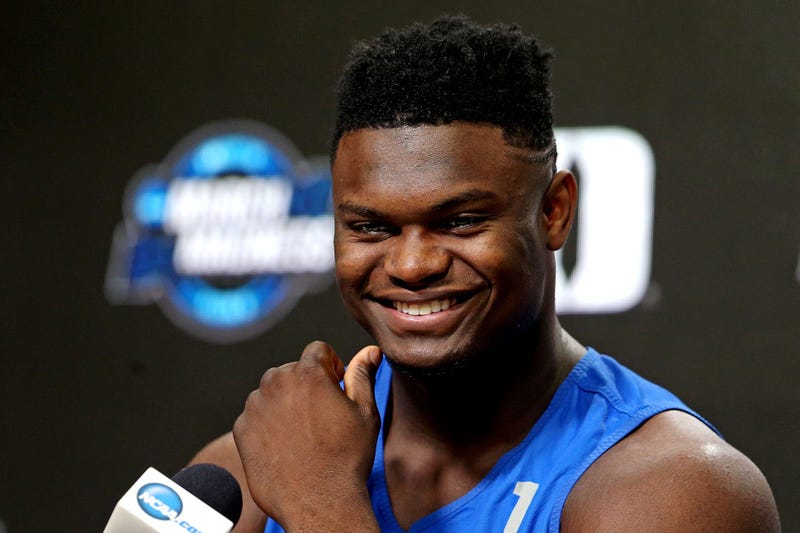
The cheers of joy and tears of triumph inside the Pelicans front office and among their fans hadn’t begun to subside when the chorus of hate and disdain from across the country took aim at New Orleans.
In a remarkably shocking moment, the Pelicans had turned their six-percent chance of winning the NBA Draft Lottery into the No. 1 overall pick. After months of inescapable sports dread, the city and region finally had reason to celebrate. Not only did New Orleans win the lottery, but they did it in a year when the most highly regarded prospect since LeBron James was set to enter the league.
It was an epic coup for a franchise that was still reeling from, and figuring out how to deal with, the Anthony Davis trade request. Sure hiring of David Griffin provided real promise, but most fans has become inoculated from any real hope.
The moment NBA deputy commissioner Mark Tatum announced the Pelicans beat the odds and secured the top overall pick, the city began a primal celebration that Louisiana sports fans hadn’t experienced since perhaps the Saints hoisted the Lombardi Trophy in 2010. Everybody from Alvin Gentry, to the Pelicans ticket sales team, to the die-hard Pelicans fans who’ve experienced 17 years of disappointment were in a euphoric stupor. Splendid sports bliss.
Yet as soon as the Pelicans celebration started, the inevitable national backlash ensued. Headlines blared “What if Zion Williamson Refuses to Play for the Pelicans?” Radio mouthpieces shouted that Williamson shouldn’t even think about playing in New Orleans. Cable networks seemingly devoted the entirety of the ensuing 24 hours to hypothesizing reasons why the Pelicans weren’t worthy of the young star’s talents.
What amazing times we live in when disdain from the elitist big city sports punditry somehow trumps the raw euphoria in one of America’s greatest, albeit not-so-big, cities. In an age when everything has turned to us-versus-them, even the NBA lottery isn’t immune.
Not only is the backlash as absurd as it was inevitable, but it’s completely unwarranted. At least if these so-called fans and analysts are interested in a healthy, vibrant professional basketball league. If we are to believe the Pelicans are so unworthy of drafting Zion Williamson, then why is most of the country propping up the New York Perennial Laughingstock Knicks as the fortification of basketball relevance where Zion’s services are most required?
Let’s first dispatch with this silly Pelicans-versus-Knicks debate.
A trial-by-combat between the Pelicans and Knicks front offices and ownership groups would be a mismatch as big as The Mountain vs. Qyburn. The people offering up Zion to New York are either blindly aware of the absurdity of their comparison or willfully trying to execute subject Williamson to four-plus years of unearned basketball torture.
The Pelicans also have a decided roster-talent advantage over their northern counterparts. Jrue Holiday, Julius Randle, and Anthony Davis (yes, he’s still under contract) are a vastly more formidable trio than anything the Knicks could surround Zion with. Even if Davis is, as expected, eventually traded away, the Pelicans would get back a king’s ransom in return. New Orleans is set up for near-immediate Western Conference relevancy while the Knicks are multiple stars away from competing in the surprisingly top-heavy East.
More importantly, it’s imperative that the NBA maintain at least the sense of competitive balance that their 30 franchises now enjoy. There are real built-in disadvantages for a franchise in a small market, like New Orleans, but there is clearly precedent where those teams can succeed with smart drafting, prudent decisions in free agency, and a wise allocation of their resources. San Antonio, Orlando, Oklahoma City, Cleveland, Indianapolis, Milwaukee, and Salt Lake City have combined for 38 conference finals appearances, 16 NBA Finals trips, and five championships in the past quarter-century. The myth that a small market can’t success in the NBA is just that; a myth.
It’s the unfortunate reality that professional sports leagues, at least the ones that fans and viewers flock to in droves, are built on competitive balance. The NFL built its empire on exactly that, where all 32 football franchises have an equal chance to build a contender through the draft and free agency. The NBA has moved on from the David Stern era, where continuous decisions and policies benefitting the largest markets were enacted. Remember the essential death-penalty Stern issued to the Timberwolves?
Current NBA commissioner Adam Silver quickly learned from the mistakes of the Stern Era, and is genuinely trying to create a model inspired by the NFL. The power of the Players Association, along with the lack of a hard salary cap, make achieving competitive balance in the NBA more difficult, but it can be done.
Zion may decide he wants to play another year at Duke. That’s certainly within his rights. He may decide to request a draft-day trade to another team, also his right but one that is highly unlikely to work on a skilled negotiator like Griffin. But right now the Pelicans have an incredible amount of leverage in the draft and in the negotiations for a possible Davis trade. It’s one of the rare times that basketball fans in New Orleans have had real reason to celebrate. To all the haters: get over it!
